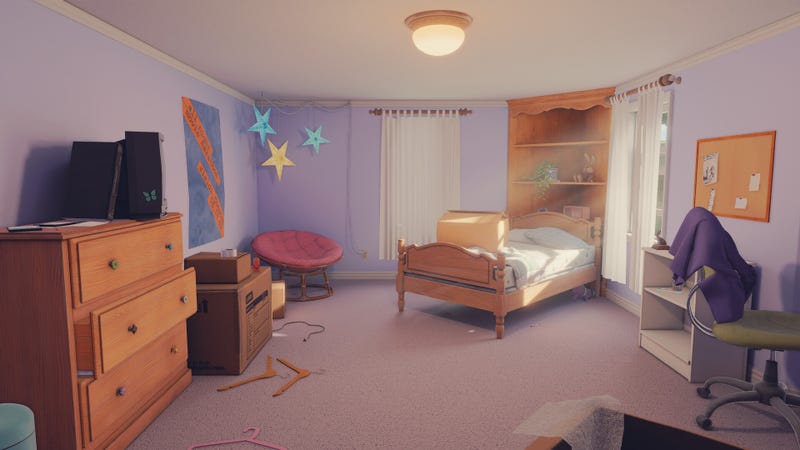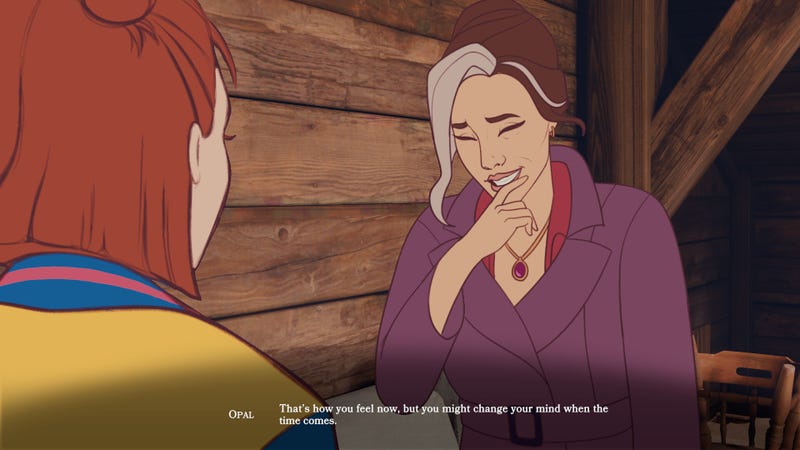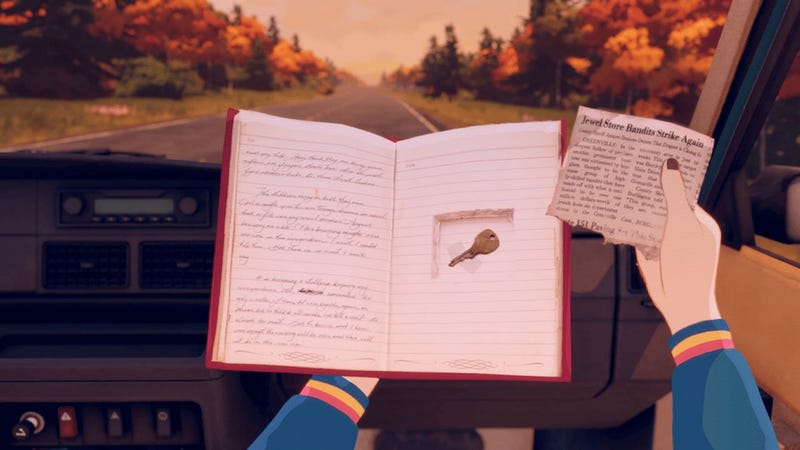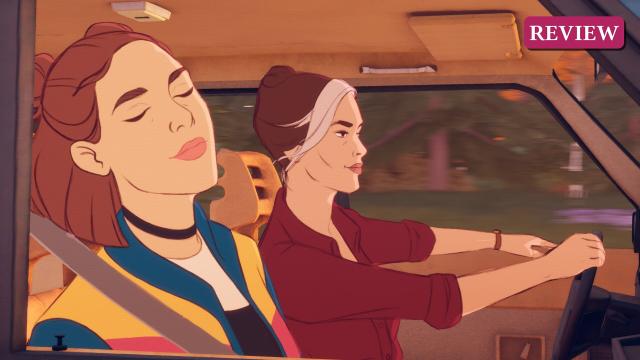Playing Open Roads constantly drags up old memories from my mind. A road trip with my mother along the Pacific Coast Highway, packing boxes and trash bags while clearing out my grandfather’s house after his death–it’s a game that feels primed to make you reminisce. Like the disparate memories the game makes me remember, however, the scenes it tells its story through feel disconnected and stitched together, a loose association of tableaux rather than a vivid, compelling narrative.
Over the course of a short road trip (which will take players roughly two hours), Open Roads tells the story of three generations of women struggling to carve out their own lives amongst the expectations of the world around them. The short narrative game is published by Annapurna Interactive and developed by The Open Roads Team, made up of ex-Fullbright developers. While clearly in the same lineage as Fullbright’s highly influential queer romance Gone Home, Open Roads tries to set out on its own path but finds itself faltering along the journey. There are emotional moments that hit home, but nothing that ever pulls the short story together by the time the road trip comes to an end.
Mother-daughter drive

Open Roads starts where all road trips start: home. Players take on the role of Tess, a young girl living with her mother Opal. They used to live with Tess’s grandmother (Opal’s mother) until she passed away. Tess and Opal can’t afford the house so they must pack up and move somewhere else. But early in the game’s story, while sifting through dust-covered objects in the attic, the two uncover a family mystery, leading the mother-daughter duo to go on an impromptu road trip hoping to shed light on the past.
As established from the very start, the game plays very similar to the likes of Gone Home. While packing up Tess’s room, you pick up objects that clue you in to the world and its characters. A news clipping tells you it’s 2003, a yearbook tells you you are in Michigan, postcards let you know that Tess’s father lives in Nevada and is divorced from Opal. But as soon as you leave Tess’s bedroom, Open Roads reveals its evolution on the familiar formula.

Tess isn’t alone in her journey, and when picking up objects, she can call out to her mom to trigger a conversation. Opal can often add context and insight that Tess doesn’t know, like details about her grandmother. While the environment is rendered in 3D, character models are drawn in a beautiful 2D style that pops against the background in a remarkable way. Beyond just conveying information about the world, these conversations let you witness the relationship between Tess and Opal play out before you. Unlike hearing letters read out in your sister’s voice in Gone Home or witnessing holographic records of past conversations between other people in Fullbright’s sci-fi game Tacoma, Open Roads lets you witness a real human connection.
This connection between Tess and Opal is the core of the game. Like in Gone Home, the loop of uncovering objects and piecing together a familial mystery is what propels the narrative forward, but here it is all in service of watching the relationship between mother and daughter twist, bend, and change. There’s real emotional complexity here to the evolving dynamic, so it makes sense that the developers sought out skilled actors to play these roles. Tess is played by Kaitlyn Dever (Booksmart, soon to be Abby in HBO’s The Last of Us )and Opal is played by Keri Russell (of Felicity and The Americans). But while the two have good chemistry, the constant back and forth only gets in the way of the emotional throughline Open Roads is attempting to focus on.
Bumps in the road
As opposed to Gone Home or Tacoma, which take place in one house and one space station, respectively, Open Roads is set across a variety of locales. Each has its own rooms, objects, and stories to unfold, with those stories being self-contained but also stitching together to inform the game’s larger narrative.
Tess, Opal, and Tess’ grandmother are all part of a singular story that plays out over multiple decades. It’s a story about the tense relationship between mothers and daughters, as well as those between wives and husbands. It’s a sweeping story that tries to touch on so many things that they end up getting jumbled and failing to serve the characters. One major issue here is that none of the game’s individual themes or emotional arcs get enough time to fully develop.
That’s because the interactions between Dever and Russell feel like short skits rather than scenes building to a meaningful conclusion. It’s not that Dever and Russell aren’t skilled voice actors, they are, but too often their interactions feel unnecessarily reliant on comedic back and forth, even when touching on the emotional anchors of the game. There’s a strong story here that you uncover as you examine the objects across the game’s locations and learn about their significance. But the game doesn’t let that story speak for itself, instead shoehorning Tess and Opal into short scenes that ultimately amount to little more than exposition that drives home what can already be pieced together by observing the world.

The way Open Roads’ snippets of dialogue push you through its many locales is more on-rails than I expected. While you still have the ability to explore environments and discover objects that add to the story, the constant commentary from Tess and Opal lessens your sense of agency. While Gone Home similarly pushes you through its house’s rooms in a somewhat predetermined order, its guidance felt subtle. Going at your own pace and following your own instincts as you pick up objects and actively unravel the story of the house where it takes place and the family who lives there was part of that, making you feel like the force driving the narrative forward. That interactivity is encouraged through simple features like being able to turn on and off the lights in rooms, letting you use the lights as a sort of marker of progress, and some players took advantage of the freedom it afforded you to manipulate objects and carry them around the house to engage in expressive acts of play, like creating little shrines to the love of its central couple.
Open Roads has no metaphorical light switches and doesn’t allow for so much player freedom or personal expression. With such a strong duo as Tess and Opal leading the game, Open Roads may have been better served as a straight visual novel. But the focus on them also makes picking up objects to unravel the mystery feel lacking. This is a story for the player to witness, not unravel through interaction themselves.
It leaves Open Roads feeling like a game at odds with itself, the family mystery that unfolds through your acts of exploration and examination versus the mother/daughter story told through dialogue between Tess and Opal. As far as road trips go, this one is a bumpy ride.

Leave a Reply